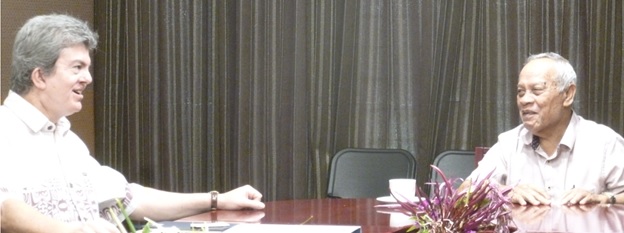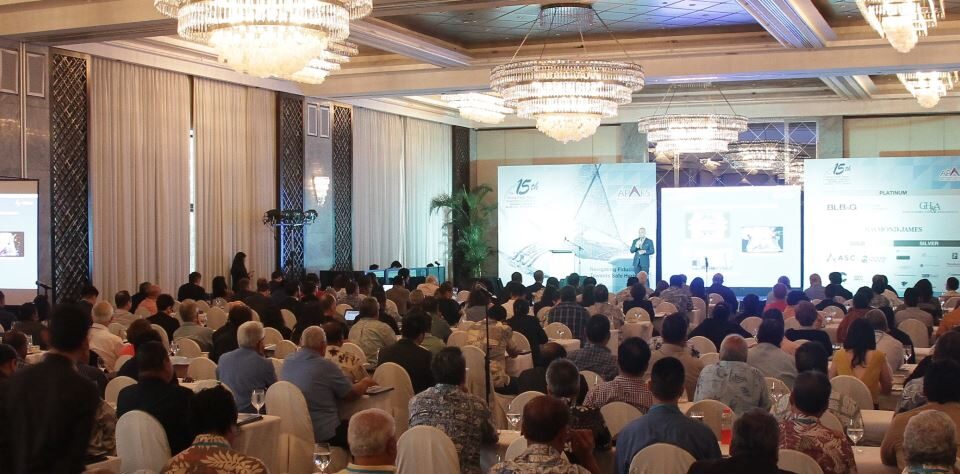FSM & Asia Development Bank Plan Closer Partnership
PALIKIR, Pohnpei—On January 17th, 2019 the Honorable Yosiwo P. George, Vice President of the Federated States of Micronesia (FSM), met with the Honorable Anthony McDonald, Executive Director for Asian Development Bank (ADB). The meeting discussed Strategy 2030 (ADB’s strategic plan and objectives to be met by that year) and how ADB and FSM can expand their partnership.
“One of the things that will be especially useful,” said Exec. Director McDonald, “is how members will receive assistance from ADB…[Strategy 2030] maps out the big picture challenges of what’s happening in Asia and the Pacific. And what it sees is that there’s increasing diversity in the nature of challenges facing countries…. We are trying not to forget Pacific Island States and Small Island Developing States…our Annual Meeting this coming May will be in Fiji, the first time it will be held in a Pacific Island State.”
While discussing how this recognition of Pacific Island interests reflects reality, Exec. Director McDonald advised that in November 2018 the minimum allocation agreement has increased from $6,000,000 to $13,000,000 per year—meaning the baseline level of assistance provided by ADB to FSM (and other member countries) will more than double.
There are two significant steps forward in our relationship that citizens will wish to be informed about. Perhaps the biggest change citizens will appreciate is that FSM is eligible for grants with ADB—not just loans. It was noted in the meeting that not all projects in the FSM originally funded by ADB loans reached the intended level of success.
“How do we improve the working relationship between FSM and ADB?” said Exec. Director McDonald. “I’ve seen this in media reports sometimes—it says ADB funds a project. And you look into it and ADB is providing a loan…and so the public commentary can be, well, what is the national government doing then? When these are actually government projects using government funds—it’s just the initial capital that’s the loan…and sometimes we don’t always provide the level of scrutiny
….”Continuing, Exec. Director McDonald said, when it came to grants, “There are so many needs amongst countries and there’s not enough funding to meet them all…and there’s a double-cost if we don’t spend it well. The first is obvious: we could have gotten better outcomes to improve the lives of the people—but it also undermines the case for us getting further support in the future.” Exec. Director McDonald noted that if the FSM is clear and direct in its grant requests that they are more likely to be realized.
“Our shared objective is the same,” said Vice President George, “to maximize benefits to our country…. While it’s unfortunate we’ve failed, we meaning FSM, in achieving the goals and objectives for previous loans, they also taught us all an important lesson: to be very serious with our projects and our desires going forward.”
The second step forward between the FSM and ADB relationship is that the latter, through cooperation with country members, is constructing country-level offices. “I can report that, when I was in the Solomon Islands,” said Exec. Director McDonald, “that they’ve had their country office since 2017…the impact it’s having is just really, really good. It helps…to have a continued presence, and a strong feel for how an individual country operates.”
ADB, once it completes the necessary logistics and planning with FSM, hopes to have an FSM country office by the end of 2019. “I’m hopeful that will happen this year,” said Exec. Director McDonald. “And if it doesn’t then it will be because something has fallen through.”
At the conclusion of the meeting, Vice President George thanked Exec. Director McDonald for visiting the FSM and government agencies to discuss the renewed role ADB can play in our economic development.




